Helping students select a research topic by helping them identify their motivations
Gherardo Girardi
London Metropolitan University
Submitted February 2010
Published November 2012
In the last edition of the Economics Network newsletter, nearly two thirds of lecturers indicated that motivating students was a significant issue of concern for them. This has also been one of my concerns over the years. About this time last year, an idea occurred to me which looked as though it could help students be more motivated. I think the idea could be usefully applied, adapted and developed by fellow educators, so I am glad to share my experience with you.
Also, I am not aware of a literature around this idea, so if you are, please let me know.
In one of the courses that I teach, Research Methods for students taking the MA in International Business, students have to select a research topic and write a proposal for their dissertation. The proposal is worth 50% of the course marks. Every time I teach this course, I find that students are very unsure as to what topic to choose. Quite a few struggle to formulate specific topics, and some come up to me with general propositions like “foreign direct investment in developing countries” or “the role of marketing in the retail sector”. Now – I thought – what if they struggle to choose a topic because they are not sufficiently aware of their motivations? By motivations, I mean motivations to do a Master’s degree, motivations to attend a course on research methods, motivations with regards to the sort of skills they wish to develop over time, motivations as to what they should be doing in life and how this relates to their studies, etc.
The exercise which I gave to students considers nine areas of motivation. They are: instrumental (how does a Masters’ degree serve me as a tool to fulfil my aspirations?), responsive/symbolic (is there anything that has caught my attention recently?), justice (is there any issue of justice which I would like to explore in my studies?), core beliefs/spiritual (what are the most important things in my life, and what topic can I choose that is related to them?), emotional (what arises in me strong emotions?), direct (is there a particular issue in business studies which I want to research, and If not, why not, considering that I am doing an MA in business studies?), socio-psychological (what have been the major influences in my life?), altruistic (how can I help the people around me?), and self-developmental (how can I grow? What skills do I wish to develop?). For more details, please see the attached Word document.
I asked students to consider the above approaches on their own to begin with, and then to form groups in which they could share and discuss their thoughts. It was glad to see that that the students were very taken by the discussions, and asked them to stop after about forty minutes. Group secretaries stood up and summarized the group findings for the benefit of all. This part of the exercise did not strike me as very useful. But the questionnaire that I gave out to students did yield some interesting results, which I will now show you. I conducted the same experiment in two Research Methods classes, in different semesters, one of 57 students, the other of 50. The group was very international, and the men:women ratio was 55:45.
The questionnaire results confirm that, at the start of the exercise, most students were very unclear as to what topics to choose:
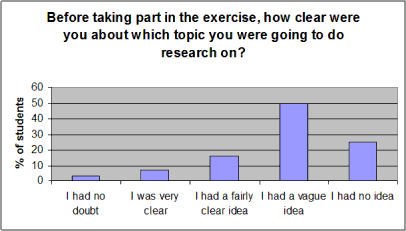
On average, students found the approach fairly helpful, and 84% of them thought the exercise should be repeated with students in the subsequent semester:
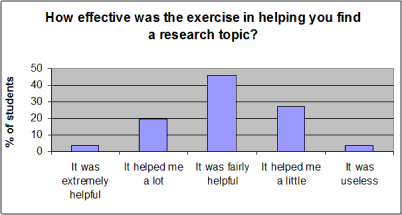
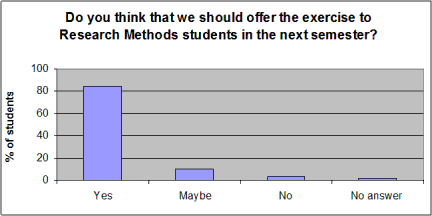
Students confirmed that they found the group discussion quite helpful, and rated the various motivational approaches fairly similarly:
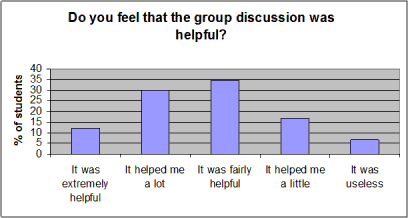
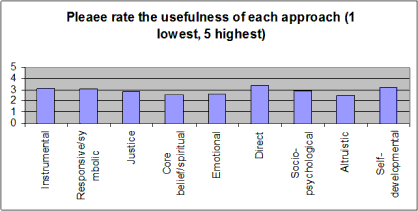
As you will probably agree, the results are quite encouraging and I intend to keep repeating the exercise semester after semester, not least because the students think it’s a good idea. I am now trying to find if there are interesting group associations, for example do different ethnic groups rate the efficacy of the exercise differently, do men prefer one particular approach and women another, and so on[1].
It remains to be seen if the exercise is actually effective in enabling students to (a) develop a better awareness of their motivations, and (b) select a research topic congruent with their motivations. This would require a more in-depth analysis of the students before and after the exercise, perhaps using a qualitative approach. For me, this is an exciting area of research as it enables me to consider the students in a more holistic fashion, and so gets me away from teaching the mere mechanics of how to carry out a piece of a research. Above all, the exercise has the potential of actually helping students cope with an issue which they tend to struggle with considerably, namely choosing a research topic.
Finally, I would like to acknowledge the gracious support of the Economics Network, who funded this project, and to whom I am very grateful.
[1] A colleague of mine tried the same experiment in a similar, third year undergraduate course taken by management students. It would seem that her students’ response was slightly less positive than my students’ response, though her sample was fairly small (22 students).

